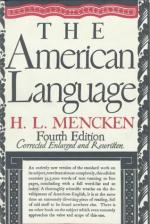|
This section contains 521 words (approx. 2 pages at 400 words per page) |

|
Chapter 9.2 Summary
The writer begins by announcing he is wandering "afield." He suggests, first, that the art of prose has little to do with grammar school English or with the "loose and lively English spoken by the average American." Prose is not based on the language of grammarians or the unconscious speech of people, he claims, but on its own principles of everyday logic. The prose of books is virile, defiant, and is middle-American.
For Mencken, the nature of prose points to what Francis Hackett identifies as the huge gap "between the literate and un-literate American." The inferior man remains inferior despite the efforts to improve him; he is suspicious of any pretense and reticent to speak in ways he is taught for fear of ridicule by peers. Mencken reinforces his assertions by reviewing the studies done on students both in classrooms and on class...
(read more from the Chapter 9.2 Summary)
|
This section contains 521 words (approx. 2 pages at 400 words per page) |

|




